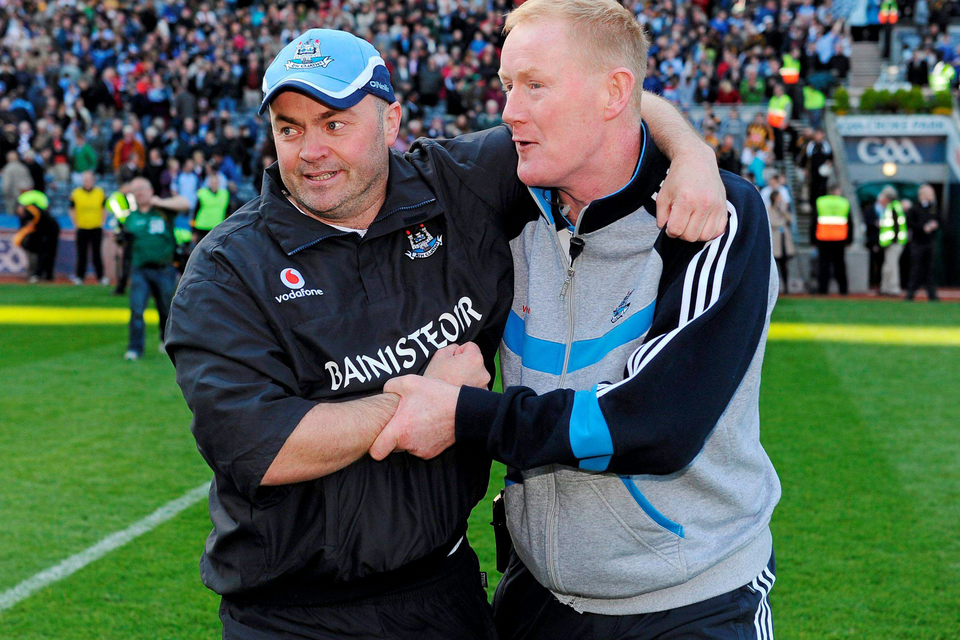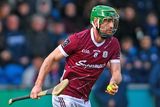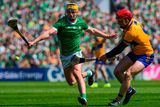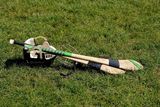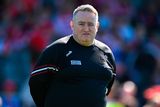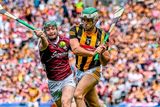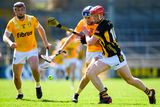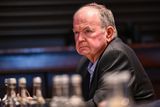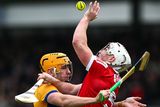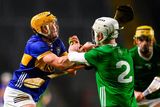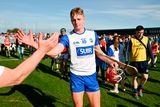Dublin still fighting for hearts and minds despite tumultuous steps taken during Daly's reign
Anthony Daly and Richie Stakelum celebrate after Dublin’s victory over Kilkenny in the 2011 Allianz Hurling League final at Croke Park
In his valedictory address to the Dublin hurlers last July, Anthony Daly made a point of referencing the great, lipsticked mistress, endlessly threatening to usurp their sense of mission.
Mindful that county board officials were in the Thurles dressing-room, Daly thanked his players for having "stuck" with hurling when he knew "it would have been easier for some of ye to go off playing football."
His words were not intended as a criticism of John Costello or the late Andy Kettle, but simply a reminder of the uniquely straitened circumstance in which Dublin tries to fence with hurling's giants.
Tipperary had just beaten them by 13 points in an All-Ireland quarter-final, convincing Daly that six years of missionary work in the capital was probably long enough.
He didn't watch The Sunday Game that night, but was subsequently vexed to hear of the slant being put on Dublin's poor performance. The team that won a National League and Leinster title on his watch had now, it seemed, morphed from chamber orchestra to stag-night karaoke machine. They were "manufactured hurlers".
That depiction jarred with Daly, particularly given the lecturing narrative that accompanied it from Ger Loughnane and Donal Og Cusack.
Dublin, the argument went, needed to present talented young dual-players with an ultimatum. They needed to cull those looking to play two sports at an elite level. Or, as some would have it, the impure.
Coming from rural hurling people, from men shaped and reared in staunch hurling areas, this seemed the height of a complacent conceit to Daly.
What was he to do in a city openly besotted with football? Throw his imaginary weight around? Threaten to resign?
Second fiddle
Of the top-rank hurling forces, Dublin stands alone as a county for whom the game plays second fiddle.
In an ideal world, Ger Cunningham's match-day squad tomorrow would include exceptional hurlers like Ciaran Kilkenny, Cormac Costello, Tomas Brady and Eric Lowndes.
But Dublin hurling will never exist in that world. To pine for it is to waste energy.
For all that, it is some measure of the legacy left by Daly that Dublin go into tomorrow's Leinster quarter-final as marginal favourites against Galway.
The League win in 2011 was Dublin's first in 72 years, while the provincial title claimed two years later was a first since 1961.
Under Cunningham in this year's National League, some of Dublin's hurling was exhilarating, just as some of it looked freighted with old stirrings of insecurity. Big-day consistency remains gallingly elusive.
Richie Stakelum was Daly's right-hand man throughout those tumultuous six years and believes that long-term self-belief will come not from looking to emulate others, but from pushing the uniqueness of the Dublin brand. Essentially from accepting all the hurdles that fate sets before them.
Dublin's destruction of Galway in the 2013 Leinster final was a performance to belittle the notion of their hurling being any kind of clunking, manufactured product.
And a couple of the early-season performances under Cunningham's baton have, in Stakelum's eyes, hinted at even further refinement.
"Dublin just need to develop a consistency," he reflects. "In the years that we were there, there were some great highs, but obviously some terrible lows as well.
"This year's National League campaign I think was pretty good. Dublin have scored way more freely this year than they did in any of the time that we were involved. But it's still the search for that consistent type of performance.
"Like that Leinster final win in 2013 . . . we would always have seen that that performance was within the team. Maybe it was the first time the public saw it, but we had seen them play like that umpteen times. We knew they were capable of that.
"It was raw, it was hungry, it was skilful and it was relentless. It was the performance that you aspired to be replicating day in and day out."
Yet aspiration and reality, too often, find expression out of different galaxies.
In his autobiography, Daly recalls a 13-point League hiding against Galway in Salthill last year that left him questioning the squad's propensity for resorting to "half-baked days".
And that is the nub of Cunningham's challenge now. For 50 minutes of their League semi-final against Cork, Dublin's hurling had a marvellous, electric feel. For the last 20, they might as well have been sitting on the bus.
They hit a similar flat-spot during the February defeat of Kilkenny in Nowlan Park. In both games, a 12-point lead disappeared almost as quickly as May sleet on a corrugated roof.
The psychological aspect of competition is something that Daly focused heavily on with the group, using men like Declan Coyle and Gary Keegan to flush out negativity.
Yet even Dublin's remarkable success under the Clare man didn't quite achieve that. Given that the footballers' game with Longford doesn't start until 4.0 tomorrow, the near-certainty is that great swathes of concrete will be visible on the Hill as the hurlers throw in.
'Dotsy' O'Callaghan recently changed clubs, moving from St Mark's of Tallaght to Ballyboden St Enda's in an effort to keep his game at the requisite sharpness for inter-county. In January, O'Callaghan claimed that west Dublin was fast becoming "a hurling wasteland".
He called for a Combined Tallaght hurling team to be established, simply to keep the game alive in that great, teeming urban sprawl. He said that the success of Daly's Dubs simply had not filtered through to the area.
Of course much is routinely made of the heavy investment ploughed into hurling coaching in Dublin. Some counties have expressed open resentment at what they regard as the prioritisation of one county over others. Indeed, in the week that Antrim slipped into hurling's third tier, such resentment is unlikely to recede.
Broader
But Stakelum suspects that people may be missing a broader central point here.
The former Tipperary captain reflects: "The impression that a coach can make in Tipp or Cork is probably far greater than it is in Dublin because you're dealing with a massive, massive amount of numbers here.
"That's something that's lost when people talk about huge big clubs in Dublin. They are big clubs but there's an awful lot of bodies and mouths to be fed.
"So it's not quite the same in Dublin. Don't forget, there's a concentration of energy, a concentration of community and a concentration of resource that's touching off the young player in Borrisoleigh or Nenagh or Toomevara.
"My own son, Tom, is involved with Kilmacud Crokes and there's football going on, hurling going on, golf going on, rugby going on, there's loads of different focuses for his time.
"But the whole community that surrounds a young fella in a country area, say in Kilkenny, it's the be-all and end-all of their existence. There's nothing else gets in the way.
"So the coaching structures in Dublin have to be continuously trying to fight for the heart and mind of a young fella.
"In Kilkenny, you're not doing that. That fight is already over. They're all going to come. It's what defines them, and more luck to Kilkenny for it.
Galway have never beaten Dublin in the hurling Championship and, if Stakelum chooses the 2011 defeat of the Tribesmen in Tullamore as his personal favourite, he is wary of any impression that this rivalry is lop-sided.
"Some of our worst performances were against Galway too," he stresses. "But I think it would be a massive statement for Dublin now to beat Galway again and maybe go on and win another Leinster title and, hopefully, eventually the All-Ireland.
"Look at Clare in the '90s. Once they got over the line and won the All-Ireland, there was a four or five year period there where everybody wanted to beat them. Teams just couldn't cope with them.
"A number of those very same players, including Dalo himself, were previously intimidated by teams like Tipp. If they could do it then, why not Dublin now?"
